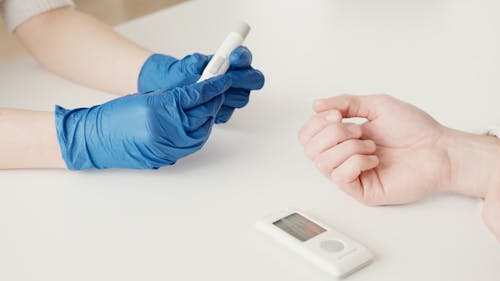
When most people think of diabetes, they immediately associate it with being unable to eat sugar. But is it enough to merely stay away from sweets if you’re diabetic? Sadly, diabetes proves to be a much more complicated health condition to live with, because it can ignite many other complications that adversely impact your major organs and quality of life.
For example, a Harvard study said those who suffer from diabetes risk a downward spiral because low blood sugar fuels dementia and other diseases such as kidney or metabolic issues. Therefore, it is vital to learn more about this disease so you can prevent its onset or manage its symptoms properly.
Today, diabetes is an endemic problem, and the WHO (World Health Organization) corroborates this by sharing that 442 million people worldwide have diabetes. To make matters worse, 1.6 million deaths annually can be attributed to this disease. Unfortunately, the prevalence and onset of diabetes have been steadily increasing over the years due to the fatty modern diet and sedentary lifestyle.
If you do not want to be a part of that harrowing statistics, it is vital to educate yourself about diabetes, especially its types and risk factors. Check out this quick overview on diabetes so you can make the right lifestyle and health choices to keep the disease at bay. This article perfectly elucidates why you shouldn’t take your blood sugar lightly.
What is Diabetes?
Diabetes is a chronic disease impacting how your body turns food that you eat into energy. What you put in your mouth (both food, beverage, and supplements) get digested and broken down into glucose or simple sugar. This is then absorbed and released into your bloodstream. When this happens, your blood sugar goes up, which signals your pancreas to release insulin.
Insulin is the hormone responsible for controlling the blood sugar levels in your body. It also helps store glucose properly in your muscles, fat, and liver. But, above all else, it helps your body metabolize the carbs, fats, and protein you consume.
However, if you have diabetes, your pancreas does not produce enough insulin, or the cells in your body do not properly respond to insulin. With insufficient insulin, or if your cells stop responding to insulin, there will be too much sugar in your bloodstream. If left untreated, this can affect every part of your body and lead to the following complications:
- Heart disease
- Stroke
- Nerve damage (diabetic neuropathy)
- Foot problems
- Loss of vision
- Kidney problems
- Gum disease
- Dental problem
- Low blood glucose
- Sexual dysfunctions
- Bladder problems

Types of Diabetes
There are three types of diabetes: Type 1, Type 2, and gestational. Learn more about them below:
Type 1
Type 1 diabetes is when your pancreas does not produce enough insulin. Hence, you need to inject yourself with insulin every day to survive. Studies show that this type of diabetes is an autoimmune reaction wherein the body mistakenly attacks itself and stops producing insulin. Around 5 to 10% of the people diagnosed with diabetes fall under type 1. Usually, this is diagnosed at a young age.
Type 2
This diagnosis means that your cells do not use insulin optimally. As a result, your body struggles to maintain healthy blood sugar levels. Most diabetics have type 2, with its onset typically occurring in adulthood. However, in recent years, more teens and kids have been diagnosed with type 2 because of lifestyle habits and food choices. Therefore, it is vital to get your blood sugar tested or do DNA screening if you have a family history of diabetes.
Gestational
This develops in pregnant women who have never had diabetes. Sadly, if you had this in pregnancy, your baby will be at higher risk for health problems. The baby can also acquire type 2 diabetes or be more prone to obesity. If you are diagnosed with gestational diabetes, it will also increase your chances of acquiring type 2 as you age. Fortunately, gestational diabetes usually goes away once you give birth.
What are the Symptoms of Diabetes?
People with type 1 diabetes may experience vomiting, seizures, nausea, and stomach pains. The onset of debilitating symptoms is rapid and severe. This usually happens to children or teens, so pay attention to any irregularities at this stage.
Meanwhile, type 2 diabetes symptoms often take years to develop. Some don’t even notice any problems, so it is important to get your blood sugar tested. You can watch out for the following symptoms:
- Frequent urination, especially at night
- Always thirsty
- Losing weight without even trying
- Extreme hunger
- Sudden blurry vision
- Tingling hands or feet
- Unusual tiredness
- Severely dry skin
- Sores that heal very slowly
- Experience more infections than usual
- Slow wound healing
Jake Cofield, a professional photographer who lives with type 1 diabetes explains, “My starting symptom of diabetes when I was younger (age 7) was frequent urination, sometimes up to 30 times per day. I was always thirsty and had no energy to play with friends. My family doctor did a blood test and my glucose levels were sky high and I began treatment soon after. Certain symptoms of type 2 diabetes are synonymous with type 1. These symptoms include frequent urination, unquenchable thirst, weight loss, and fatigue.”
Gestational diabetes may or may not present with the same symptoms. If you are pregnant, your obstetrician will typically check for gestational diabetes around 24 to 28 weeks of pregnancy. Then, depending on your blood sugar results, you may need to make some changes to protect your health and your baby’s health.
Common Risk Factors
Because diabetes symptoms are hard to spot, you must be aware of your risk factors. This means you are more likely to have one of the three types of diabetes if you meet the following conditions:
- Family history (your relatives are diabetic)
- Age (usually older than 45 but now also manifest in younger people)
- Ethnicity (certain ethnicities are more prone to it)
- Overweight
- Physical activity of less than 3 times a week
- Have had gestational diabetes
- Given birth to a baby more than 9 pounds
- Women diagnosed with PCOS (polycystic ovarian syndrome)
Diagnostic Testing for Diabetes
If you experience any of the above symptoms, seek advice from your physician. You may then be referred to see an internal medicine specialist to further evaluate your situation. Typically, testing for diabetes includes the following:
- A1C test
- Fasting plasma glucose test
- Random plasma glucose test
Additionally, gestational diabetes tests include the glucose challenge test and oral glucose tolerance test. All of these diagnostics are conducted under a laboratory setting with specific instructions from your doctor.
Managing Diabetes and Learning to Live With It
If you are diagnosed with diabetes, you must learn to live with the disease. Although there is no cure for diabetes, making certain lifestyle changes will help. Here’s what you need to do to ensure optimal health:
- Manage blood glucose
- Monitor blood sugar at home
- Check blood pressure
- Minimize cholesterol
- Quit smoking and drinking
A healthy diet coupled with frequent and regular physical activity can also help you manage your disease. You must work with your medical practitioner to create a plan that’s suited for you. Following this plan may include taking an oral medication, injecting insulin, or taking other shots. Do not deviate from this plan to prevent complications.
Moreover, if you have other health-related problems, you will be given maintenance medications to manage those as well. Notably, for morbidly obese people, weight loss bariatric surgery is a suggested treatment plan.
Though type 1 diabetes and gestational diabetes usually occur because of your family history. Meanwhile, you can prevent type 2 diabetes with lifestyle changes. For example, you can eat healthier, exercise, and lose weight.

Most of all, if you are advanced in age or have a strong family history of diabetes, it is vital to get tested for prediabetes. This means your blood sugar levels are higher than normal, but they are not high enough to warrant a type 2 diagnosis. A simple blood test will determine if you are prediabetic.
Additionally, you may opt for genetic screening such as a DNA test from CircleDNA. The DNA test results will reveal any genetic risk of diabetes as well as genetic risk for developing other diseases such as asthma, cancer, or psoriasis. When you are armed with more knowledge about yourself, you can make healthier decisions. You can also stay more proactive about your diet and exercise, as this helps manage type 2 diabetes. Healthier life choices reduce the overall impact of diabetes in your life.







This Post Has 2 Comments
Comments are closed.